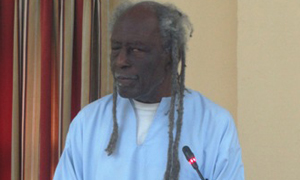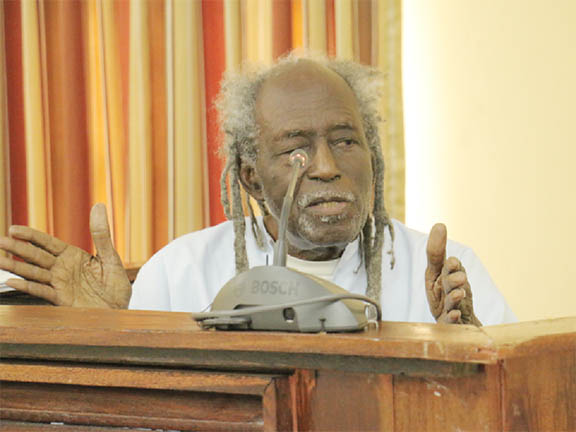
Eusi Kwayana Testified before the Walter Rodney Commission of Inquiry
By Wazir Mohamed
Associate Professor Indiana University East
Veteran Guyanese Political Leader and activist Eusi Kwayana recently returned to his home base in San Diego California after GIVING FOURS DAYS OF TESTIMONY at the Walter Rodney Commission of Inquiry in Georgetown Guyana. The Walter Rodney Commission of Inquiry concluded its second sitting on June 6, 2014. World renowned historian, social justice activist and Guyanese political leader Walter Rodney was assassinated in Guyana on June 13, 1980. At the time of his death he was leading the Guyanese struggle against dictatorial rule and for the return of democracy and civility in the South American nation.
Eusi Kwayana gave eye witness account on the nature of politics, state repression, lack of press freedom, repression of the people’s right to assemble and protest, and the extent the police went in the torture of members and associates of the Working People’s Alliance after it was formed in the mid-1970s. Kwayana, a co-founder of the Working Peoples Alliance explained the reasons for the formation of the WPA, the humanist approach of the party towards struggling for a united multi-racial Guyana in which the people are empowered to participate in the decision making processes. This is the context within which he explained the intervention and the politics of Walter Rodney. In his testimony he explained how this approach of the WPA and Walter Rodney was counter to the political trend that developed after the split of the Peoples Progressive Party (PPP) in 1955; that ushered in racial/ethnic competition for political power and access to economic resources including jobs and status between the dominant racial/ethnic groups in the country. Kwayana’s testimony established the foundation for the Commission to understand the structure of the society, a society that endured racial riots in the early 1960s, racial tensions since the mid-1950s, rigged and fraudulent elections in 1968, 1973, 1980, and 1985, a rigged national referendum in 1978 that ushered in a constitution that resided power paramount power with the leader of the ruling party, a process that produced the necessity to swear allegiance to the leader and to enlist as a member of the ruling party as a means of keeping and getting a job in the state sector (the state sector controlled 80% of the economy between 1976 and 1989). Kwayana also PROVIDED the Commission evidence of the humanism and political character of Walter Rodney, whom he opined had little interest in becoming a maximum leader.

Eusi Kwayana’s testimony before the Walter Rodney Commission of Inquiry of was crucial on account of his role and experience in the politics of Guyana since the early 1950s. Eusi Kwayana formerly Sydney King (born 4 April 1925), is a politician, teacher and cultural activist. A cabinet minister in the People’s Progressive Party (PPP) government of 1953; he was detained by the British Army in 1954. In 1964 he helped form ASCRIA (African Society for Cultural Relations with Independent Africa), a Pan-Africanist grassroots political group that, after a brief flirtation with the People’s National Congress (PNC) of Forbes Burnham, fused to form the Working People’s Alliance with other groups and individuals in 1974. Kwayana became WPA’s sole Member of Parliament in 1985 after the party was accorded a seat in the National Assembly in elections of that year. Kwayana retired from parliament in 2002 and migrated to San Diego, California where he currently lives with his family. He is the author of several books, including Next Witness, Scars of Bondage, Guyana: No Guilty Race, Buxton in Print and Memory, Morning After, Genesis of a Nation: The Indo-Guyanese Contribution to Social Change (in Guyana) and Walter Rodney: His Last Days and Campaigns. As was reported to the Walter Rodney Commission of Inquiry he has made major contributions to Guyana’s political process. Another example of this is the fact that he wrote the lyrics of the party songs of Guyana’s three leading political parties, the PPP, PNC and WPA.
DURING HIS STAY IN GUYANA KWAYANA ALSO PARTICIPATED IN A PUBLIC DISCUSSION AND APPEARED ON THE TELEVISION PROGRAMME “GROUNDINGS”.


